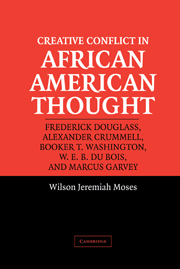Book contents
- Frontmatter
- Contents
- Acknowledgments
- Preface: Struggle, Challenge, and History
- 1 Introduction: Reality and Contradiction
- FREDERICK DOUGLASS: THE INDIVIDUALIST AS RACE MAN
- 2 Frederick Douglass: Superstar and Public Intellectual
- 3 Where Honor Is Due: Frederick Douglass as Representative Black Man
- 4 Writing Freely? Frederick Douglass and the Constraints of Racialized Writing
- ALEXANDER CRUMMELL: THE ANGLOPHILE AS AFROCENTRIST
- BOOKER TALIAFERO WASHINGTON: THE IDEALIST AS MATERIALIST
- W. E. B. DU BOIS: THE DEMOCRAT AS AUTHORITARIAN
- MARCUS MOZIAH GARVEY: THE REALIST AS ROMANTIC
- CONCLUSION: RESCUING HEROES FROM THEIR ADMIRERS
- Index
3 - Where Honor Is Due: Frederick Douglass as Representative Black Man
Published online by Cambridge University Press: 07 November 2009
- Frontmatter
- Contents
- Acknowledgments
- Preface: Struggle, Challenge, and History
- 1 Introduction: Reality and Contradiction
- FREDERICK DOUGLASS: THE INDIVIDUALIST AS RACE MAN
- 2 Frederick Douglass: Superstar and Public Intellectual
- 3 Where Honor Is Due: Frederick Douglass as Representative Black Man
- 4 Writing Freely? Frederick Douglass and the Constraints of Racialized Writing
- ALEXANDER CRUMMELL: THE ANGLOPHILE AS AFROCENTRIST
- BOOKER TALIAFERO WASHINGTON: THE IDEALIST AS MATERIALIST
- W. E. B. DU BOIS: THE DEMOCRAT AS AUTHORITARIAN
- MARCUS MOZIAH GARVEY: THE REALIST AS ROMANTIC
- CONCLUSION: RESCUING HEROES FROM THEIR ADMIRERS
- Index
Summary
Frederick Douglass' status as the greatest African American abolitionist and orator of the nineteenth century seems unshakable. He was certainly the most accomplished master of self-projection. Appropriating with stunning genius the Euro-American myth of the self-made man, he guaranteed that the story of his struggle would be canonized, not only within an African American tradition, but within the traditions of the mainstream. He manipulated the rhetoric of Anglo-Saxon manhood as skillfully as did any of his white contemporaries, including such master manipulators as Abraham Lincoln, Ralph Waldo Emerson, and Phineas T. Barnum. I mention Douglass along with these wily exemplars of American showmanship, not because I want to drag out embarrassing cliches about making heroes more human, but in order to address the truly monumental nature of Douglass' accomplishments. Douglass, like Lincoln, Emerson, and Barnum, was abundantly endowed with the spiderish craft and foxlike cunning that are often marks of self-made men.
Douglass, like his bluff contemporary Walt Whitman, made his living by the art of self-celebration, a skill that has always figured in the strategies of American literary figures. He sang his song of himself through four main versions of his autobiography, creating himself as a mythic figure and racial icon. The result is that even scholars and historians who may be relatively unfamiliar with other black American personalities of the nineteenth century are acquainted with the major events of Douglass' life, or at least with his version of them.
- Type
- Chapter
- Information
- Creative Conflict in African American Thought , pp. 46 - 60Publisher: Cambridge University PressPrint publication year: 2004



